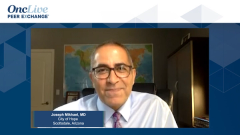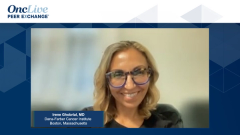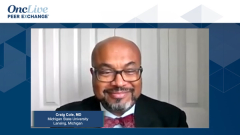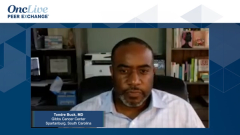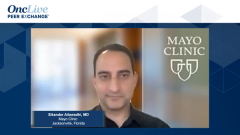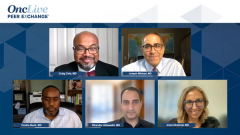
Disparities in Multiple Myeloma Care: The Path Toward Health Equity
Expert panelists share their closing thoughts on the path to improve health equity in multiple myeloma management for racial and ethnic minority groups.
Episodes in this series

Transcript:
Joseph Mikhael, MD: As you think about it even in your own experience, sometimes issues of diversity, and equity, inclusion. We hear so much about DEI. I often say DEI is political, personal, or professional. I try to take the political bit out and focus on the personal and the professional. That this isn't just what we do every day, but that there is a personal commitment that's involved with this, and understanding looking at your own inner circle, how diverse is your circle? How much interest are you, even as Crag said, when you're looking in the chart and trying to learn about someone, are you taking an interest in someone's culture and background? That's a notion of sensitivity and even humility, to listen, to understand, to hear things better. That is an area where if each of us have that - I'm not going to say epiphany, but that commitment individually, that will influence on others. I look at the 4 of you doing this panel with me and I know how many medical students, residents, fellows, and junior faculty are influenced by you. And they'll see you and they'll emulate that as we go through. But time's nearly gone, let's just do a quick circle around here. I'll start with you, Irene. Any final thoughts, things that you want to conclude on as we get to the end of our time together here?
Irene Ghobrial, MD: No, I just enjoyed this discussion we had today. It enlightens me more, and the passion everyone has to make a difference is so critical. As everyone said, early diagnosis, early access to care, caring about every individual without the biases that we all carry. And hoping to chip through all of this to make a difference, and to help every patient we see. And hopefully that can make the difference.
Joseph Mikhael, MD: Excellent, wonderful. Thank you, Irene.
Sikander Ailawadhi, MD: Absolutely, ditto. Whatever Irene said, perfectly said. But I'll leave our group with a thought of a forward looking or a forward vision kind of a thought. In the very beginning, we said where do we take this field? How do we take that next step? I'll give you a very quick example of something that we're doing which I'm quite proud of how we put that together, is one of the forthcoming cooperative group, a CTEP sponsored clinical trial through the cooperative groups around the country is going to be for newly diagnosed, transplant ineligible, 'elderly frail' population. Which is looking at the various frontline therapies and comparing them randomized phase 3 trial head to head comparison. It's going to be through SWOG ECOG alliance, et cetera. But we have actually spent hours and hours together to say in this NCI sponsored CTEP driven trial, what are we going to do to make a difference? The inclusion criteria have been completely revamped. If a patient is not on dialysis, and that was for some technical issue, that patient will be allowed to go on the trial. No longer is 8g the cut off, we'll drop the hemoglobin cut off to 7g. Frankly, all of us sitting on this panel and those who are listening to us, if that patient shows up to our clinic, we're not going to say, "Hey sir, your hemoglobin is 7.5, sorry I can't treat you, go to the next person." We're going to treat that patient. Why should that patient not get on a clinical trial? We are building a DEI plan on the sideline of that trial right now when the trial is being written, to say what do I expect to enroll in this national clinical trial? Am I meeting that criteria or not? And if I'm not enrolling, and this is for maybe about 200, 250 sites where this study is going to be open across the country, why are we not hitting the mark? We're putting that plan together, and hopefully as the trial opens up, we get to talk about it. But those kind of forward-thinking thoughts will move our field together in addition to when Craig said addressing the bias, in addition to when Tondre said let's get the patient to the right treatment and let's leave our bias at the door when we enter that room to see our patient.
Joseph Mikhael, MD: Beautiful work, Sikander. Congratulations on doing it. We anticipate that coming. I know that it's been in the works, and I appreciate that you're not looking if you will, the clinical aspects, but the bigger aspects of the study like that. Craig, I'm going to come to you. And before you give your closing statement too, maybe you can answer another question that's come in saying do we have any advice for in-patient health disparities improvement? Are there things that we should maybe keep in mind specifically when it comes to in-patients? And then feel free to make some concluding thoughts. And we'll come to you last, Tondre.
Craig Cole, MD: There was a study that looked at in-patients with myeloma based on race. And there were some striking things that came of that, and one thing was that there were more hospitalizations of African Americans. There were more deaths in Hispanic people with myeloma. One thing I thought was striking was that people of color had less engagement of palliative care and pain care in the hospital. And the one disparity that we didn't talk about is just around pain, and the disease that affects the bones. That we must be cognizant that again some of those little biases are where is this patient going to go if I give them pain medications? We must leave all that behind. Treat just like Dr Buck said, treat our patients like our family, and don't make these assumptions. And with in-patients, that we know that these patients may have more anemia, they may have more renal sufficiency, but make sure that we're treating their pain adequately. And for my final statement, what can we do to help? Being on this call, being on this podcast, being on this live MedLive®, you're already being informed, aware, and helping the process. Because you'll leave this call today and you'll start making changes armed with the information that we talked about today. Which makes me excited because the world and this field is changing, thank goodness.
Joseph Mikhael, MD: Well said, Craig. Always with such passion. Tondre, I'll give you the last word before I close off, my friend.
Tondre Buck, MD: Once again guys, it's been great. But my approach has always been a simple approach, and it's kind of like what Craig just said. You treat every patient with respect and remember what we're here for. We're here to hopefully make someone's life better. And as it related to myeloma, the first step is to recognize that we have a problem in terms of disparity. That's the first step, and my solution is that I hope we can create a hundred Craigs, and Joes, and Irene’s, and Sikander’s, and just keep pumping out in this disease that disproportionately affects African American patients. My short term ask would be to keep up the good fight, and just one patient at a time, and keep going. And anything that I can do to help facilitate that.
Joseph Mikhael, MD: Beautifully said. It's hard for me to add much more to that after you've said it so well. We trust everyone has enjoyed the program today, and it's been helpful to you. We've discussed so many things today. We started with what is the problem, the magnitude of the disparity, how it's based not only in biology but in the society, how it's manifest in so many ways from timing to diagnosis, access to the key therapies that we need, and even bias within the healthcare provider population. And then we tried to think about some ways that we can solve that, some ways with greater awareness, with awareness in both the lay and the medical side, with a very dedicated approach to access to clinical trials, and transplants, and novel therapies that requires more resources, that requires a sensitivity. But a passion all the way along, and indeed ultimately something that each of us have to take on individually as healthcare practitioners. We trust all of this is not just some academic discussion, but something that can genuinely help. As we see as Sikander shared and Irene shared, the future of the research and the work that we're doing, and it's evolving. We may reach a day where we do screen people at certain high risks for this disease where we hopefully can intervene even earlier to make a difference. I want to thank this incredible panel for your insights, I want to thank all who have been listening. We hope you found this OncLive® peer exchange program of value to you. We appreciate your feedback, and your evaluation is always critical to us as we move forward. And we trust that as more and more of these programs are carried out, that we'll have a greater impact in bridging this gap and reducing the size of the health disparity that we've described today. Thank you.
Transcript edited for clarity.


